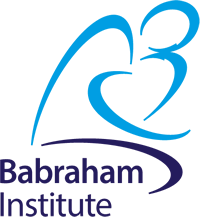The Babraham Research Campus (BRC) is pleased to announce that it has been awarded a BBSRC Collaborative Training Partnership (CTP) Award for 15 PhD Studentships (5 per year for 3 years) to start in October 2022.
The BRC CTP is a joint partnership between the Babraham Institute, the BBSRC and BRC and a range of innovative tenant companies on the Campus working in the Bioscience for Health BBSRC priority area. The goals of the BRC CTP are (i) to train excellent PhD students in the advancing frontiers of bioscience discovery and the Bioscience for an integrated understanding of health priority areas and to provide them with a range of scientific and transferable skills; (ii) to give them ‘real-world’ experience of working in the commercial bioscience sector through their respective collaborative PhD projects and (iii) thereby train the next generation of researchers, skilled in modern techniques, critical thinking and business skills. The distinct features and location of the BRC will provide students with access to real-world examples of translational activity, innovation and entrepreneurship and will lead to future careers in academia, industry and science-based tech transfer and commercialisation.
The Babraham Institute is a world-leader in fundamental biological research investigating the systems that underpin development and healthy ageing. It is a recognised postgraduate University Partner Institute of the University of Cambridge. Starting October 2022 five BRC CTP Studentships will be available leading to a University of Cambridge PhD degree. These studentships can be awarded for up to 4 years.
Project details
Ageing is a well-described risk factor for multiple chronic diseases, including dementias such as Alzheimer’s disease (AD) and frontotemporal dementia (FTD). There is a need to understand the processes underlying age-related cellular dysfunction to inform the development of novel therapeutics. This project brings together academic and industry experts to explore some of the key early events common to ageing and neurodegenerative processes.
Protein misfolding and mislocalisation are key hallmarks of neurodegenerative diseases and ageing. In familial forms of AD and FTD, such protein changes are directly related to autosomal dominant mutations in specific genes, providing a valuable model to study disease pathogenesis. FTD-causing mutations in the gene encoding the neuronal microtubule-associated protein tau (MAPT) result in MAPT mislocalisation from neuronal axons to the cell soma, where MAPT-microtubule complexes can disrupt nucleocytoplasmic transport and alter nuclear morphology. Similar changes in nuclear shape and nuclear membrane function are a common feature of cellular ageing, and have been described in a range of disease including FTD, Alzheimer’s disease and Hutchinson-Gilford progeria syndrome. Although clearly disease-associated, how these changes to nuclear integrity affect gene regulatory mechanisms, higher-order chromatin structure and the transcriptional or functional response in human neurons is currently unknown.
In this project, the candidate will employ validated, human in vitro neuronal systems generated from patient-derived induced pluripotent stem cells to model the disease-associated nuclear phenotypes caused by MAPT mislocalisation. These model systems will be used to decipher the molecular mechanisms that underpin changes to nuclear structure and function during neuronal cellular ageing and disease.
Using a blend of cutting-edge functional genomics techniques (including ATAC-seq, RNA-Seq, CUT&Tag, massively parallel reporter gene assays, and Hi-C) in combination with high-content imaging and functional analyses, the candidate will characterise the gene regulatory landscape during neuronal differentiation (induced pluripotent stem cells, neuroepithelial cells, committed neuronal precursor cells, and mature neurons), comparing wild-type cells to cells with a MAPT mutation causal for disease. This will be followed by genetic perturbations using CRISPR to pinpoint gene regulatory variants with crucial functions in neurodegenerative diseases and in the erosion of nuclear function during ageing.
This multidisciplinary project provides a unique opportunity to be part of highly collaborative academic and industry teams throughout the duration of the project, providing a strong foundation for a career in academia or industry. The candidate will benefit from training and mentorship both from the Schoenfelder lab (experts in chromatin biology and functional genomics) and the Talisman team (experts in stem cell models and biology of neurodegeneration) and will gain insights into both academic and commercial drug discovery environments.
The project will enhance our understanding of cellular dysfunction during neurodegeneration and ageing, with the potential to discover novel biomarkers, identify new drug targets and to inform future anti-ageing interventions.
How to apply
All applications for PhD Studentships at the Babraham Institute need to be made using the University of Cambridge Graduate Application Portal regardless of funding source. Please see the “Applying for a PhD” pages on our website for further details of the application process.
We hope to be able to invite short-listed applicants to attend our Institute Graduate Open Day on Wednesday 19th January 2022 for a series of interviews. This will give applicants an opportunity to meet Group Leaders and their research groups, as well as receiving a tour of our research facilities. Reasonable travel expenses will be paid to those invited.
Students will not be able to take up an award unless they meet all University eligibility criteria and are successful in securing admission to the University. In addition, they will not be able to apply for a visa (if needed) until they hold an unconditional offer from the University.
The deadline for submission of applications via the Graduate Application Portal is Thursday, 2nd December 2021. Incomplete applications will not be considered.
If you have any questions not answered on our website or the University of Cambridge Graduate Application Portal, please contact us [Email Address Removed]
For further information, please contact [Email Address Removed] and [Email Address Removed].

 Continue with Facebook
Continue with Facebook



